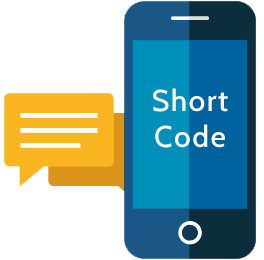What is a shared short code?

A short code is a five to six digit phone number that is used for sending and receiving text messages for marketing purposes. When selecting a short code for a marketing campaign, brands have the opportunity to choose between obtaining a dedicated short code or getting a shared short code. Both types of short codes can send and receive text messages, but there is a major difference – the number of users.
Shared short codes are shared among multiple brands. In essence, a lot of brands use the same short code for advertising purposes. For identification purposes, brands using shared short codes usually utilize keywords, which allow SMS providers to know which brand a consumer is trying to text. A dedicated short code, however, is owned by only one brand, and the brand is solely responsible for anything it does with the short code.
Shared short codes are the most popular type of short codes, especially among Small and Medium Scale Enterprises. This is because owning a dedicated short code is quite expensive, with prices sometimes hitting up to $6000 per year. This price might be far too much for small brands to cope with; to solve these problems, a small brand would usually have to share the short code with a lot of other brands, sometimes around hundreds. While shared short codes may seem cheap to use for text message marketing, shared short codes may potentially be expensive in the long run. The use of just one short code by a lot of brands usually brings up a couple of issues which might adversely affect the brands’ businesses.
One of the most devastating effects that can arise out of using a shared short code is getting banned by other marketer’s mishaps. Since hundreds of brands might be using just one shared short code, all of the brands are responsible for whatever is done with the short code. If one brand flouts a rule governing the use of the shared short code, the software provider or the wireless carrier can actually suspend the shared short code, cutting off all the other innocent brands using the short code in the process. The suspension of a brand’s short code can have devastating effects on its text message marketing campaign, and can consequently have long-term effects on sales and turnover. What is worse is that a brand would have to suffer the consequences of the actions of another brand. Unfortunately, the suspension of shared short codes is not such an uncommon occurrence and a lot of companies are losing millions of dollars every year due to the suspension of their shared short codes.
Another disadvantage of shared short codes is that brands sometimes have to share a short code with brands whose values or services come into conflict with the values of their businesses. This may have negative effects on customer loyalty and sales, as some customers may try to contact them, input the wrong keyword, and end up talking to a brand they really do not intend. This may not seem like such a big issue, but in value-sensitive businesses, this may actually have highly unsavory effects.
Another problem with shared short codes is that one brand’s customers may end up opting in for another brand’s services. Legal issues pertaining to consent may arise when a subscriber receives messages he did not intend to consent to in the first place.
Keyword availability is another area of concern when it comes to sharing short codes with other brands. If hundreds of brands share one short code, multiple brands offering just one kind of service may end up using the same short code. If all the viable keywords related to your brand have been taken by other brands offering the same service and using the same short code, it can cause serious communication problems for your business.
Shared short codes are cheap, but their affordability definitely comes at a cost. Even if a brand finds it impossible to avoid using a dedicated short code, plans should be put in place to upgrade to a dedicated short code as soon as the business can comfortably afford it. Shared short codes should only be considered as a short-term solution for digital marketing campaigns.
(Inspired by Tatango)
